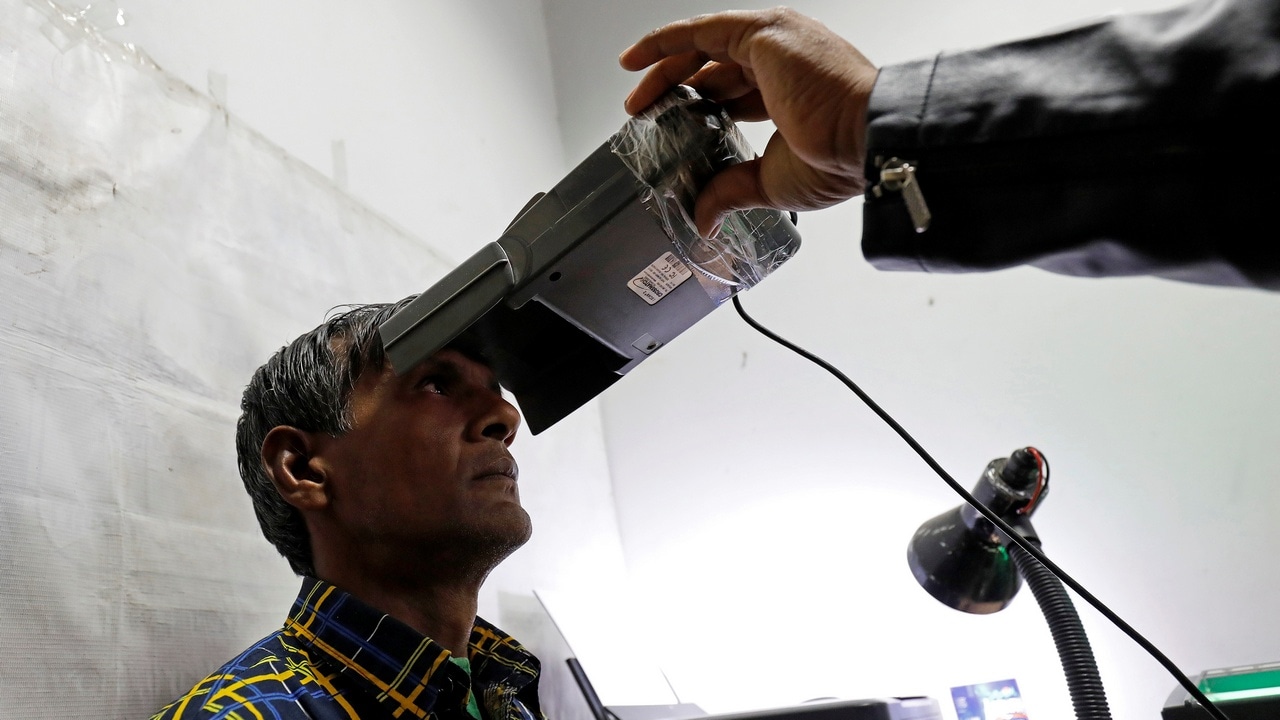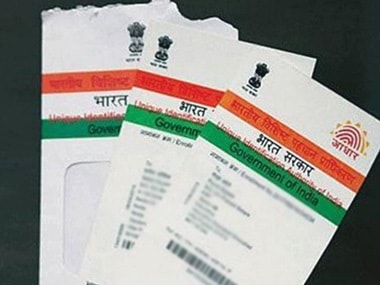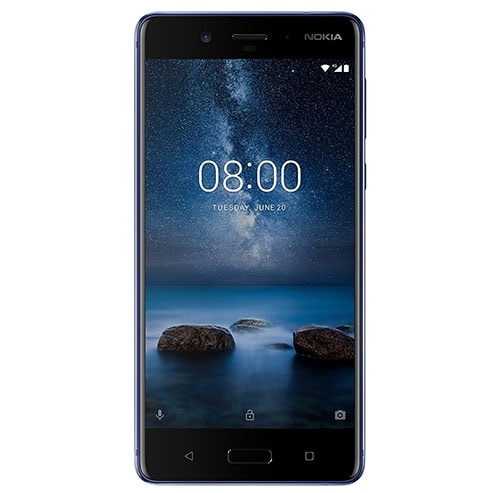On Day 14 of the Aadhaar hearings, senior counsel Arvind Datar commenced his arguments on behalf of the petitioners. His main argument was on the Aadhaar bank account linkage under Rule 9 of the Prevention of Money Laundering (Maintenance of Records) Rules. On the petitioners requesting an interim order to extend the 31 March deadline, the Court declined it for the moment, indicating that it would be considered at a later stage. The State suggested that the extension be considered in the last week of March.

A woman goes through the process of finger scanning for the Unique Identification (UID) database system, Aadhaar. Image: Reuters
Additional arguments are on the Aadhaar PAN linkage under Section 139AA of the IT Act, and the Aadhaar PAN verdict was sought to be revisited in view of the right to privacy verdict. It was also argued that Aadhaar could not be a money bill. Even if the Aadhaar project is upheld, its use should not extend beyond subsidies.
RBI recognises six documents for bank accounts
Commencing the argument on Rule 9 of the PMLA Rules, the petitioners started with comparing this to the Reserve Bank of India’s Master Direction on KYC, 2016. These RBI Directions allow the identity of a person for the purposes of KYC, and therefore opening a bank account, to be established via an ‘officially valid document’ (OVDs). This includes any of six documents, which includes a passport, driving license, PAN card, Voter’s card, NREGA job card or the Aadhaar card. In fact, for ‘low risk’ persons who don’t possess any of these documents, the KYC directions also recognise six alternate documents, which include utility bills, municipal tax receipts and even bank account statements.
Amended Rule 9 mandates Aadhaar and PAN
The new Rule 9 of the PMLA Rules, however, mandate Aadhaar along with PAN, for the purpose of identification for opening or having a bank account. Moreover, as per Clause 17(c) of this rule, for those failing to submit their Aadhaar cards with PAN, their bank accounts will cease to be operational until they do so.
This rule thus contradicts the previous rules issued by the RBI.

A man goes through the process of eye scanning for the Unique Identification (UID) database system, Aadhaar, at a registration centre. Image: Reuters
The petitioners argued that the RBI Directions covered all matters with respect to identification in bank accounts. The RBI Directions, for instance, contain provisions for due diligence both at the time of opening bank accounts as well as subsequently. Suspicious transactions are also to be flagged and reported. The RBI Directions, in particular, also allow a customer to provide any one of the prescribed OVDs, and thus stood in direct conflict with the PMLA rules.
Which rule will prevail?
This thus leads to the issue of which of these contradictory rules will prevail over the other. The Bench initially suggested that the PMLA rule should prevail over the RBI Directions. The petitioners, however, denied this, arguing that there was no hierarchy between the two. The RBI Directions have a statutory flavour, and thus they stood on the same footing as the PMLA rules. The Bench agreed to this point.
The petitioners also raised the issue of requiring Aadhaar cards from the managerial personnel of a company. They argued that there was no question of using Aadhaar to establish the identity of a company.
Blocking bank accounts is draconian
The petitioners went on to argue that the rule requiring bank accounts to be made non-operational was draconian. This is also due to the fact that the Aadhaar Act itself makes Aadhaar a voluntary scheme, which makes this rule ultra vires the Aadhaar Act. The petitioners pointed to the Aadhaar enrolment forms, which had stated that enrolment was free and voluntary, and to the interim orders of the Supreme Court, which had restricted the mandatory use of Aadhaar to 6 schemes only.
The petitioners argued that the Aadhaar Act thus gives the people a choice to have Aadhaar. The PMLA rule, on the other hand, unfairly classifies people based on this choice, and discriminates between them. A person exercising his legitimate choice not to have Aadhaar, unfairly runs the risk of having his bank account made non-operational. Rule 9 thus violates Article 14 — the right to equality, under the Constitution.
The petitioners further argued that this violated the people’s right to property under Article 300A of the Constitution. The Bench, here, pointed that the money in the bank accounts was not being forfeited, but was only being made unavailable temporarily. To this, the petitioners argued that so long as there was a deprivation of property, it was immaterial whether it was temporary or permanent.

A man goes through the process of eye scanning for the Unique Identification (UID) database system, also known as Aadhaar, at a registration centre in New Delhi, India. Image: Reuters
Lal Babu Hussein case on en masse identification
The petitioners went on to quote the Supreme Court’s judgment in Lal Babu Hussein v. Electoral Registration Officer, a case having direct relevance to Aadhaar based identification.
Here several people in various regions were en masse declared to be suspected of being foreigners, and were asked to prove their identity as citizens within a limited period of time, and via specific documents only. Those failing to do so would have their names struck off from the electoral rolls. The fact that the persons were previously enrolled in the electoral rolls, indicating that procedures had been undertaken previously to establish their identity before so enrolling them, had been completely disregarded.
The Supreme Court had ruled that this was unconstitutional and quashed the proceedings. The Election Commission was asked to commence fresh proceedings, if it so desired, through suitable notices as well as by informing the people of the basis of its suspicions that they were foreigners. The Court directed that adequate value be given to the fact if such persons had previously been enrolled in the electoral rolls, and that any form of identification or other evidence provided by the people be taken into consideration for establishing their identity.
Drawing an analogy with the call drops case
Lastly, the petitioners also sought to draw an analogy between the Rule 9 and Master Direction conflict, and the Supreme Court’s verdict in COAI v. TRAI, the call drops case. Here, the SC had struck down the regulation imposing penalties for call drops, on the grounds of its contradiction with a previous regulation, which identified an acceptable call drop parameter of 2 percent.
The current regulation found the regulation imposing the penalty to be in violation of the TRAI Act as well as violative of Article 14 and 19(1)(g). The Bench, however, drew a distinction between this case and the current one, stating that the call drops case dealt with two delegated legislations under the same power, whereas the current case deals with legislations issued under separate powers.
The arguments for the petitioners will continue today.
Sources of the arguments include live-tweeting of the case by @prasanna_s, @SFLC.in and @gautambhatia88, and LiveLaw Reports.
Read our past coverage of the on-going Aadhaar Supreme court hearing:
Why SC needs to look into technical evidence of Aadhaar’s surveillance capabilities
Lack of governmental ownership of CIDR’s source code can have serious consequences
Will State give citizens rights only if they agree to be tracked forever, asks lawyer Shyam Divan
Petitioners argue on centralisation of data and challenge Aadhaar’s claims on savings
Petitioners argue for a voluntary ID card system that does not collect user data
Aadhaar is architecturally unconstitutional, argue the petitioners
Petitioners seek compensation for starvation deaths and extension of March 31st deadline
The author is a lawyer and author specializing in technology laws. She is also a certified information privacy professional.
Published Date: Mar 07, 2018 13:57 PM | Updated Date: Mar 07, 2018 13:57 PM



















